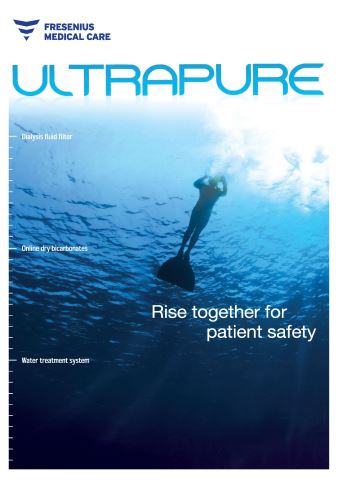
Fresenius Medical Care today announced the launch of the organization’s first World Patient Safety Day initiative to raise awareness of the importance of ultrapure dialysis fluid for developing economies across Asia Pacific. (Graphic: Business Wire)
Hong Kong:
Fresenius Medical Care, the world’s leading provider of dialysis products and services, today announced the launch of the organization’s first World Patient Safety Day initiative to raise awareness of the importance of ultrapure dialysis fluid for developing economies across Asia Pacific. On 17 September each year, the World Health Organization (WHO), international partners and all countries commemorate World Patient Safety Day: a day that aims to increase global awareness of the need to protect patients in healthcare settings. Fresenius Medical Care Asia Pacific has chosen this important day to highlight the crucial role that ultrapure dialysis fluid (UPDF) plays in reducing morbidity and mortality in hemodialysis (HD) patients,1 and to launch a multi-year initiative providing ongoing healthcare professional education to increase the uptake of high-quality dialysis fluid.
Water is an essentialrequirement for HD and patients are highly vulnerable to contaminants that may be present in that water.2 This means that the quality of water used for dialysis fluid is critical and has led to the use of UPDF, which is defined by the ISO organization as containing <0.1 colony-forming unit/ml (CFU/ml) using sensitive microbiological methods and <0.03 endotoxin unit/ml (EU/ml).1
Studies have demonstrated that the use of UPDF prevents inflammation and its detrimental biological and clinical consequences, as well as better preserving residual renal function in HD patients.1 Further, the use of UPDF is associated with a lower risk of infection and inflammation, and significant reductions in cardiovascular events, morbidity and mortality.1,3,4 However, in developing countries, UPDF is not always used, with the low quality of dialysis fluid having potential negative outcomes for patients.5 A survey reviewingthe quality of dialysis fluid in dialysis facilities in Vietnam and Cambodia found that the endotoxin level in only two of the four facilities surveyed was satisfactory, while the bacterial counts in dialysis fluids were not acceptable in any of the facilities surveyed.5 The study’s authors concluded that there was an urgent need for developing countries to educate healthcare workers in preparing endotoxin-free dialysis fluid.5 Furthermore, there is good evidence that UPDF is technically and economically feasible for most dialysis centers, with the additional costs offset by indirect and direct health benefits.1
The International Organization for Standardization (ISO) has developed a series of standards for the quality of dialysis fluid and concentrates. Notably, Fresenius Medical Care’s complete portfolio of products – from water treatment systems, dialysis concentrates, dialysis machines and filters – are aligned with these standards. “By driving awareness and adoption of the ISO standards, we are helping to enhance the safety of patients, protecting them from the risks associated with impure water and improperly prepared dialysis fluid,” said Mr. Harry de Wit, CEO of Fresenius Medical Care Asia Pacific. “We have chosen World Patient Safety Day to highlight the importance of this issue.”
The company will utilize a series of educational initiatives with input from company and external experts presenting on different aspects of UPDF and the ISO standards. These will begin with an online symposium presented on World Patient Safety Day, ‘Does Ultrapure Dialysis Fluid Matter in Hemodialysis?’ and publication of a white paper, ‘Turning the tide: Maintaining water quality for dialysis through an ISO framework’, which healthcare professionals, dialysis technicians and engineers can obtain from their local Fresenius Medical Care representative.
Key panelist on the symposium, Dr. Titus Lau, Senior Consultant, Program Director for Hemodialysis at National University Hospital, Singapore, spoke to the urgency of this initiative: “High quality dialysis fluid is a basic component of good hemodialysis treatment. Ensuring microbial purity and electrolyte consistency is crucial and must be an integral part of the management of any dialysis unit. The existing technology makes ultrapure dialysis fluid attainable and dialysis providers should make an intentional effort towards this level of water quality to ensure the best possible outcomes for all their patients. It is certainly appropriate for Fresenius Medical Care to conduct this online symposium as part of the activities on World Patient Safety Day to help focus on a less visible component of dialysis care but one that is certainly of great importance.”
Disclaimer: This content is distributed by Business Wire India.


